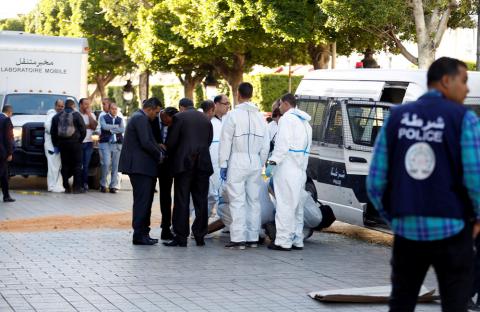Advertisement
Woman blows herself up in Tunis, wounding 15 people including 10 police officers
TUNIS (Reuters) - A woman blew herself up in the center of the Tunisian capital on Monday, wounding 15 people including 10 police officers in an explosion that breaks a period of calm after dozens died in militant attacks three years ago.
Witnesses said the blast happened on Tunis's central Habib Bourguiba avenue. Hundreds of police cordoned off an area near the landmark Municipal Theatre and the French embassy, while ambulances evacuated the wounded.
"I was in front of the theater and heard a huge explosion," Mohamed Ekbal bin Rajib told Reuters.
Security has improved since authorities imposed a state of emergency in November 2015 after attacks on tourist targets that scared off holidaymakers and investors, worsening an economic crisis caused by a chronic deficit.
"We thought we had eliminated terrorism but we hope that terrorism will not bring us down, especially with the bad political climate in Tunisia now," President Beji Caid Essebsi said.
Shops were closed on the busy avenue that was the scene of protests that toppled long-serving leader Zine El-Abidine Ben Ali at the start of the 2011 "Arab Spring".
The bomber, aged 30, had no known militant background, the interior ministry said. Local media gave her name as Mouna.
"The woman left her city three days ago and told her family that she was going to the capital to look for work", said Walid Hkima an official in interior ministry. She had a university degree in English and was from the coastal governorate of Mahdia, he said.
No tourists were injured, a security source said.
In 2015, 21 people were killed during a hostage siege in its national museum, the Bardo in Tunis, and a gunman killed 38 people on a resort beach. The following year, militants tried to capture the town of Ben Guerdane near the Libyan border.
There have been no attacks on that scale since then, but the economy has remained troubled and the authorities are concerned over the presence of militants in neighboring Libya.
Tunisia is one of the few Arab democracies, and the only country to throw off a long-serving autocrat during the Arab Spring without triggering large scale unrest or civil war.
It is credited for its democratic transition, its free elections and the guarantee of fundamental rights in its new constitution.
Some 3,000 Tunisians have joined Islamic State and other jihadist groups in Iraq, Syria and neighboring Libya while dissent over unemployment has risen in recent years in southern and central areas.
(Reporting by Tarek Amara and Ulf Laessing; Writing by Peter Graff and Ulf Laessing; Editing by Matthew Mpoke Bigg)



















Add new comment